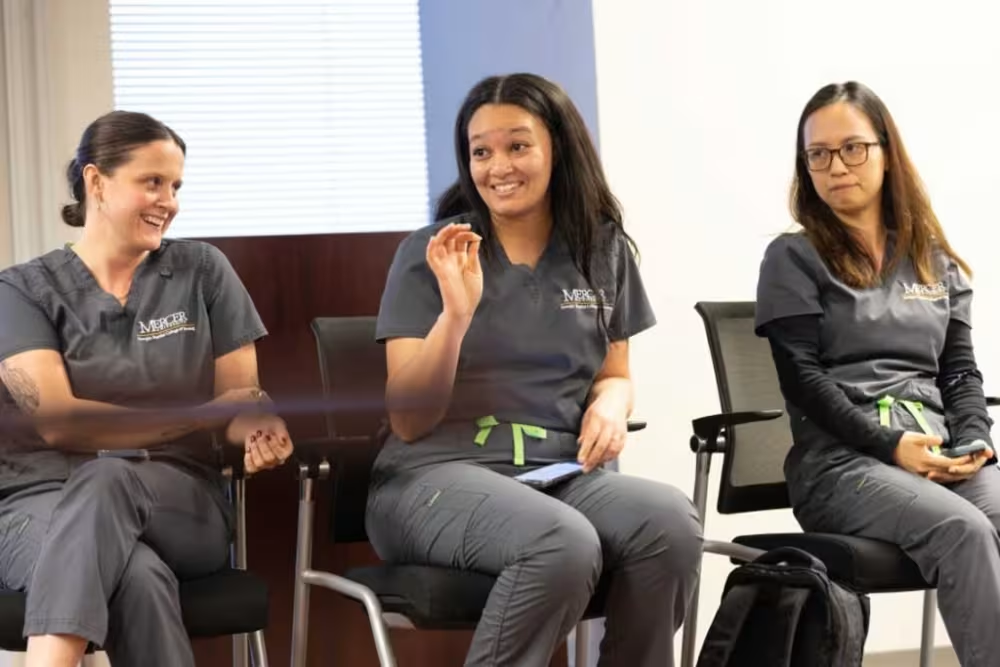What Do Nursing Schools Look for in Applicants?
Each blog post is dated and contains accurate information as of that date. Certain information may have changed since the blog post publication date. If you would like to confirm the current accuracy of blog information, please visit our ABSN track overview page or contact admissions at 844.347.2108.
What do nursing schools look for in applicants? Students should be dedicated, compassionate, and organized communicators. If a nursing degree sounds right for you, you can apply to Mercer’s ABSN track and work toward earning a BSN in as few as 12 months.

If you hold a non-nursing bachelor’s degree, you can apply your previous education toward a nursing degree and take meaningful steps toward a new, rewarding career sooner. Nursing schools seek applicants who demonstrate compassion, a strong commitment to the profession, and completion of required prerequisites and application materials. Mercer University’s Second Degree Accelerated Bachelor of Science in Nursing (ABSN) track empowers motivated students to earn a nursing degree in as few as 12 months after admission, faster than most other accelerated nursing programs.
Nursing is one of the most in-demand careers in healthcare, with room for advancement along a diverse range of career paths. If you are interested in nursing and want to know whether it could be right for you, learning what nursing schools look for in applicants can help you recognize and hone these qualities in yourself.
Discover some of the top nursing student qualities, see how Mercer ABSN helps students develop them, and learn more about the steps to get into a nursing program.
1. Dedication
Successfully completing nursing school is hard work, especially when completing courses on an accelerated timeline. Dedication is a key nursing quality that applies both during your studies and throughout your career. At Mercer, we are dedicated to providing our students a comprehensive nursing education with a curriculum rooted in holistic and evidence-based practices.
During your time as a student, you will engage with:
- Online accelerated nursing coursework
- In-person skills and simulation labs
- Clinical rotations throughout the Metro Atlanta area
With daily study sessions and a strategy to stay on top of assignments, you can learn the curriculum while absorbing some of our core values that contribute to patient-centered care. Both faculty and fellow cohort members are here for you and can help with studies and support.

2. Compassion
Nursing is both a career and a calling—one that requires skill, dedication, and compassion. While the work can be deeply involved, a genuine commitment to patient care can make a meaningful difference in outcomes and patient experiences. Nurses serve as caregivers, educators, and advocates, and their compassion not only supports patients but also sustains them in their professional journey. Compassion is increasingly considered an integral component of quality care that can even help improve patient satisfaction and outcomes.
When our enrollment counselors reach out, they are genuinely interested in getting to know you—your personal story and what drew you to this field.
3. Organization
Gaining the knowledge to enter nursing practice in as few as 12 months requires excellent organizational skills. Successful ABSN students set study and coursework schedules, take comprehensive and organized notes, and are punctual for in-person aspects of the curriculum like clinicals, labs, and exams.
Not only will organization help you as a nursing student, but it will also translate to your professional practice as a nurse. Nurses often organize the efforts of the patient care team and complete paperwork to keep knowledge of a patient’s condition up to date across different shifts and care team members.
4. Communication
Nurses spend much of their time on the job communicating with others––whether talking to patients and their family members or charting information for reference by other healthcare professionals. This makes strong written and verbal communicators excellent candidates for nursing roles.
Check in regularly with your enrollment counselor as you prepare your application. This two-way communication will help ensure a smooth and successful start to your journey as an ABSN student.

Learn more about the importance of teamwork in nursing and see how you can apply it throughout labs, clinicals, and beyond.
Steps to Apply to Nursing School
These nursing student qualities are a great foundation for your education. Where you earn a nursing degree can also impact the opportunities you will have and the values that will guide your nursing career.
As a Mercer ABSN student, you will be able to learn from expert faculty committed to innovative professional practice, the promotion of health, and service to others. In-person nursing labs at our Atlanta, Georgia, location and clinical rotations at top area healthcare facilities in Metro Atlanta will also provide an enriching start to your nursing career.
See the steps you can follow to apply to an ABSN program like Mercer’s ABSN track.
1. Research Nursing Programs
As you consider pursuing a nursing degree, research all available options best for your needs. Mercer’s ABSN track is designed for individuals who hold a previous non-nursing bachelor’s degree. While the majority of coursework is completed online, students are required to attend in-person labs and clinical rotations at our Learning Site in Atlanta, so make sure that you are within commuting distance.
Consider the culture of the program as well. This is a leadership-oriented track designed to educate you as a nurse while preparing you with the foundation for long-term career success.
2. Contact an Enrollment Counselor
Reach out to the admissions team early. An enrollment counselor will want to get to know you and learn more about your motivation to become a nurse. Mercer is committed to providing you with personalized support through the admissions and enrollment process.
3. Develop Your Academic Plan
Different institutions have different admissions requirements, including GPA requirements, prerequisites, and other materials. Mercer ABSN enrollment counselors will work with you to form a personalized academic plan for your application. This includes considering your desired start date, any necessary prerequisites, and a timeline for any other materials you will need to gather or create.

4. Complete Any Needed Prerequisites and Submit Materials
You will most likely need to complete nursing prerequisite courses before enrolling as an ABSN student. Prerequisites for Mercer’s ABSN track provide the foundation for nursing school courses, and you will take courses on subjects including:
- Human anatomy and physiology
- Microbiology
- Abnormal psychology
- Statistics
- Pathophysiology
- Nutrition
- Lifespan development
- Religion
Completing these indicates that you are equipped to succeed as an ABSN student.
You will also need to submit materials like transcripts, a resume, and an admissions essay as part of applying to Mercer’s ABSN track. Your enrollment counselor will help you to craft these materials in a way that positions you as a strong candidate for nursing school.
See what nursing school is like as a student and what you can do to succeed as an ABSN student.

5. Take the TEAS
At Mercer, all applicants are required to take the Test of Essential Academic Skills (TEAS) and achieve a minimum composite score of 76%. While not every ABSN program includes this requirement, we believe it plays a key role in setting students up for success. The TEAS helps ensure that each admitted student is academically prepared for the fast-paced, rigorous nature of an accelerated nursing curriculum.
6. Submit Your Application
After you’ve completed all prerequisites, submitted the required materials, and passed the TEAS, you’ll be ready to submit your application. From your first conversation with us, our team is here to guide and support you. You can feel confident knowing your application is complete and ready for review.
Take The Next Step Toward Nursing With Mercer ABSN
As a nursing school applicant, you are equipped to take on the challenge of earning a BSN degree and succeed through hard work. Mercer’s ABSN track is an excellent option to earn your nursing degree in as few as 12 months, and you will graduate ready to take on the NCLEX-RN licensure exam. Contact us today to speak with an enrollment counselor and take the next step toward your future career.
